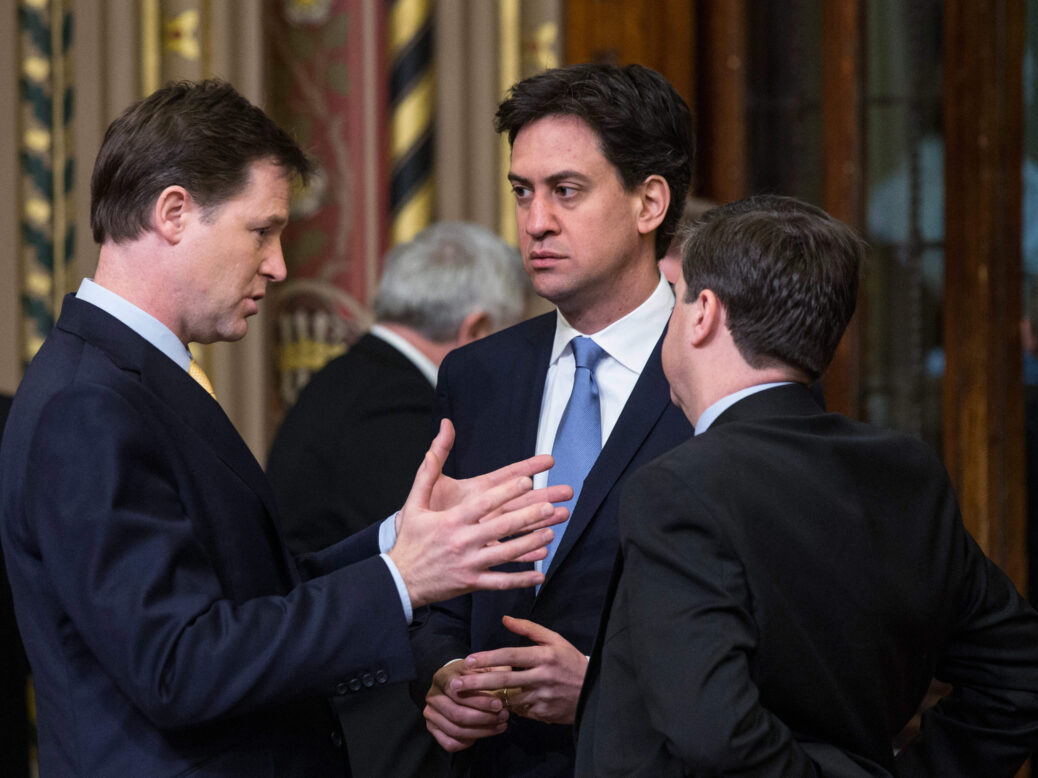
Denis Healey once quipped that the sight of a pin flying through the air indicated the presence nearby of John Major with a grenade in his mouth. I was reminded of this old joke by Nick Clegg’s efforts to position himself as the commander of pro-EU forces in the European Parliament elections on 22 May.
The recent televised debates with Nigel Farage were meant to illuminate the Deputy Prime Minister’s courage as he detonated a few Europhobe myths. Getting blasted in the face was not the plan.
Senior Lib Dems deny that is what happened. The goal, they say, was never to stop Farage in his tracks, only to begin the fightback against “the Eurosceptic establishment” – a cute inversion of Ukip’s claim to be maverick insurgents. Inevitably it needs more than two hours of live TV to drill through Britain’s anti-Brussels prejudice – “a Eurosceptic sediment that has built up over 20 years”, in the words of one cabinet minister.
But allies of the Lib Dem leader also admit that they underestimated the likely impact of instant audience polls after the two debates. Both awarded victory to Farage. Any credit due for championing an unfashionable cause was lost in media portrayals of a hapless Clegg vanquished.
Labour and the Tories are happy for the Lib Dems to martyr themselves for Europe, albeit for different reasons. Ed Miliband’s instincts on the subject are hardly distinguishable from Clegg’s. However, the Labour leader wants to use the campaign in May to develop the themes that will be central to his bid for Downing Street next year – the cost of living; the unfair distribution of rewards in a lopsided economy. Labour’s preferred method for countering Ukip incursions into its northern-English heartlands is to depict the party as a virulent new mutant strain of Thatcherism.
David Cameron is more at ease talking about Europe as long as the conversation is limited to Labour’s reluctance to call a referendum and Farage’s inability to deliver one. Things get difficult for the Prime Minister when the question arises of how he would vote in that putative poll. The logic of his position is more pro-EU than he admits. The intent to renegotiate British membership is based on the assumption that any deal would be so attractive that Cameron could sell it as the centrepiece of the “in” campaign. It is also supposed to involve reforms that other member states can embrace as general improvements to European governance. He cannot spell out a plan in detail because Conservative backbenchers would denounce it as insufficient and continental leaders would warn that it is unrealistic. The stability of the Conservative Party currently relies on the pretence that Cameron can broker something that looks simultaneously like a renewal of vows and
a divorce to two different audiences.
Most Tory MPs are aware that the No 10 position is untenable but, with the exception of a hard core that enjoys tormenting the Prime Minister, they play along in the hope that brittle unity will last long enough to get them over the electoral finish line in 2015. None expects it to survive beyond that.
Lib Dem ministers are privately contemptuous of how Cameron buys security from his party by licensing loose talk of quitting the EU, although conspicuous displays of rampant Tory Europhobia help support Clegg’s claim that his party performs a moderating function in government. The Prime Minister’s counterclaim is to depict the Lib Dems as slavish devotees of a European status quo – as fanatical in Brussels idolatry as Ukip is in animus. Downing Street insists Cameron’s reform-and-referendum combination is uniquely aligned with mainstream public preference.
That would help the Tories if the argument were about reforming European institutions but in reality the case for less “Europe” has dissolved in fear of more immigration. Farage exploits the way even mild pro-EU advocates have always internalised but never properly articulated a belief in the economic and cultural merits of a liberal migration policy.
The free movement of labour among member states is a non-negotiable part of the project. Yet politicians who believe the UK gains from the arrangement find the rhetorical muscles they need to make the case have atrophied from lack of use. Abstract arguments based on the aggregate increase in opportunity lack the emotional immediacy of Ukip’s claim that foreign interlopers take UK jobs.
The pro-European cause is in crisis because British politics has for years encouraged the idea that an admirable government is one that stymies the roaming of workers across national borders, while tacitly accepting the condition of EU membership that makes such control impractical. The only honest pro-European argument is one that says it isn’t even desirable.
Clegg has already found to his cost what a tough sell that can be. Labour flinches at the mention of immigration policy, unsure how to resist xenophobia while wooing back voters who abandoned the party because it was too kind to foreigners. The Tories are also split, though more discreetly, between economic liberals who see the benefits of immigration and Ukip-ish gate-slammers. It is a guarded Treasury secret that George Osborne tires of his party’s anti-immigration monomania, since he recognises the relationship between openness to foreign skills and economic growth.
There isn’t a shortage in Westminster of people who know the arguments, whether for Britain’s EU membership or a liberal immigration regime. The deficit is in people who can make the case without sounding like they’ve got grenades stuffed in their mouths.






